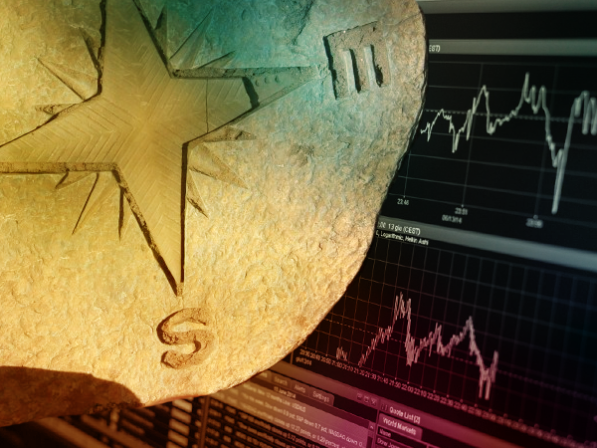Stocks are up 30% from their March lows, but one market watcher believes that gold’s recent surge in price exposes the rally as a false one. Find out why here.

The hard-hit stock market has seen a recovery of nearly 30% since the March lows that were brought on by the coronavirus sell-off. Yet even though the stock movement seems to be giving off an aura of optimism, CCN’s Joseph Young points out that this optimism is not only misguided, but also questionable.
As Young notes, the recovery itself rests almost solely on the belief that the pandemic will subside and that the U.S. and global economies will recover. Setting aside scientists’ warnings that the nature of the virus could be seasonal, the data itself appears to point in the opposite direction, forecasting an economic contraction even in a best-case scenario where world governments get a handle on the virus.
Young expects reality to set in as soon as Q2 earnings reports are released, which should wake up investors to the true state of the economy. Most corporations have already downgraded their revenue expectations in a move that clearly signals lower productivity. As just one example of the hollowness of the stimulus-powered stock market gains, Young refers to commentary by Dave Portnoy, founder of Barstool Sports and host of a stock market show called Davey Day Trader.
Portnoy singled out the Norwegian Cruise Line, whose stock went up 20% even though the company has all but closed up shop, to highlight just how unrealistic expectations are. Yet not all investors are buying into the tale of economic recovery, as evidenced by the movement in the gold market.
Gold has posted exceptional gains over the past week, closing Friday right around $1,700 an ounce. To Young, the constant inflows into the gold market show a lack of confidence in the global economy and the many uncertainties that surround it. The stock market acts as gold’s biggest competitor, yet the metal has moved up alongside stocks both ahead of the pandemic and during its seeming resolution, suggesting that investors are plenty aware of the actual state of affairs.
Indeed, even before the first mentions of the coronavirus began to pop up, there were many warnings that stock market valuations were overblown and that the 11-year bull market was running on fumes. The flock towards the supposed safety of bonds, despite their historically low showings, further affirms a lack of belief that a recovery is underway.
As for stocks, the aforementioned warnings have only grown more intense, and Young thinks that a correction could be very close. The Relative Strength Index (RSI) of the Dow is approaching 70%, and Young notes that a 70%-75% range translates to highly overbought territory. Should a correction in the Dow occur as the world continues to reel from the effects of the pandemic, Young believes that the downturn in sentiment could be exceedingly harsh.
